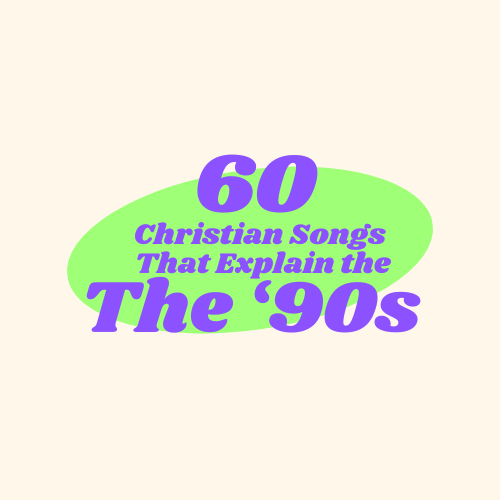Introducing "60 Christian Songs That Explain the '90s"
Songs from the past that shaped our present
What were the most popular songs when you were 14 years old?
That was 1995 for me. A lot of music from groups like Boyz II Men, TLC, and Hootie and the Blowfish were big. 2Pac, Biggie, Mariah Carey, Green Day, Counting Crows, Alanis Morissette. All of these artists were huge. You couldn't change the radio dial in your car without hearing them. Unless it was a country station. Then you're hearing Tim McGraw, George Strait, Faith Hill, and the GOAT, Garth Brooks.
But why 14 years old, you wonder? Because research shows that's the typical age people find their musical identity. That's the music you want to go back to, time after time. As much as you 40-year-olds love T-Swift, her music isn't grabbing your soul quite like Boyz II Men singing "On Bended Knee."
In my 14-year-old world, there was also Jars Of Clay, Audio Adrenaline, and Big Tent Revival. There was Steven Curtis Chapman, Amy Grant, and Michael W. Smith. Contemporary Christian Music. Youth group. Clean lyrics. All of those things penetrated my world as a teen. It was music that shaped much of what I thought about religion, about my faith, and about myself.
Over the past few years, anytime I've been mowing the lawn, walking the dog, or driving alone in the car, I've been playing the podcast 60 Songs That Explain the ‘90s. It's fun and even educational. Each episode features a different song from the last decade of the 20th century. And though it's titled "60 Songs", the podcast's popularity demanded more. So it doubled in size, stretching to 120 songs.
Within those 120 episodes, I reminisced on songs I love, remembered songs I had forgotten, and learned about songs (and artists) I was largely unaware of (it shouldn't have taken a podcast for me to truly appreciate Lauryn Hill's "Ex-Factor"). Where else was I going to learn that:
Dave Coulier ("Joey" from Full House) was likely the subject of Alanis Morissette's "You Oughta Know"?
A scar from an abusive past was the reason Mary J. Blige didn't show her full face on the cover of her first few albums?
There was a troubling history behind Sinead O'Connor and Prince's relationship?
There’s a reason "All I Want for Christmas Is You" has such audible appeal?
The real story behind Semisonic's "Closing Time" has little to do with a bar shutting down?
But covering even 120 songs wasn't enough. The podcast’s host, Rob Harvilla, managed to leave out an entire category: contemporary Christian music. Sure, 99% of CCM "hits" never left the local Christian radio station. Secular pop radio might have played a DC Talk or Amy Grant song. Rock radio played some P.O.D. bangers. In large part, songs labeled as Christian were sectioned off into a bubble, encased in a solitary radio station and Family Christian Bookstores.
But these songs, ones talking about God's love (or some not even mentioning God at all) impacted millions of boys and girls. They spurred on a new generation of artists. They played a massive part in the building of teenage faith. For some people, they exist as a monument to a faith long since abandoned.
I think it's important someone talk about those songs. That someone discusses the lyrics, the artists, and the music that shaped so much of what Christians felt and thought in the 90s and today.
I started this Substack last summer with little true direction. I simply wanted a place to write, to post with some regularity the thoughts I had. To this point, it's largely been random, a Waffle House hashbrown smattering of recollections, current events, and poetry.
I'm placing this all in a more clear direction. Consider this the introduction to 60 (Christian) Songs that Explain the '90s. I've got a rough list of 60 songs to cover. Some you'll know well. Some you've probably never heard. That's okay. We'll learn new things together.
Maybe this isn't your thing, reading some dude's thoughts on old songs played only on Christian radio. That's understandable. Not everyone has any nostalgic connection to The Newsboys, Amy Grant, or Rich Mullins. Not everyone cares about the ‘90s Christian culture that gave us Promise Keepers, WWJD bracelets, and the True Love Waits movement.
But my goal is to make this a place to just simply reflect on the music/culture, and not a place to mock it all (there are plenty of other places already doing that). It's to understand more about how these songs written by broken people helped us understand a faith that we may (or may not) hold close to.
I'll post about a new song each week-ish. I hope you'll stick around.




